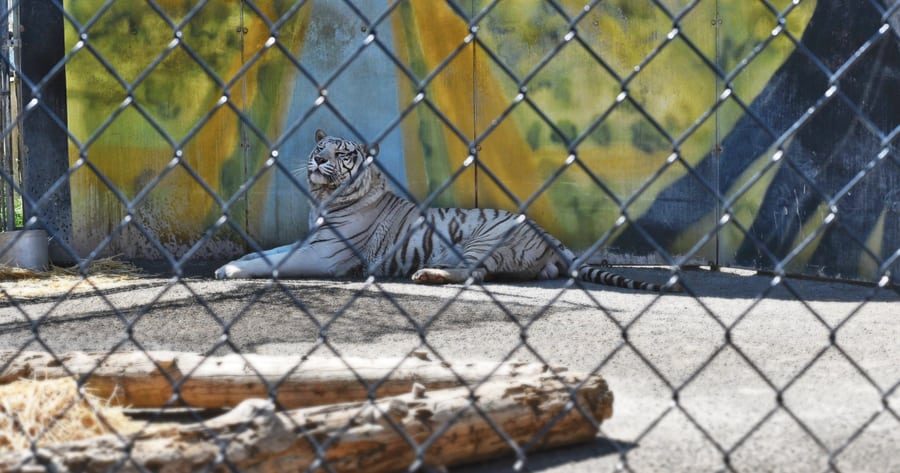
Home » Cat Tales Zoological Park offers rare opportunity to get up close and personal with big cats
Cat Tales Zoological Park offers rare opportunity to get up close and personal with big cats

June 15, 2016
A regal tiger stretches out in the sun, perched atop a branch. It lazily pops up its head up every few minutes and glances around.
Even though relaxed, its eyes are piercing and wild. It’s a sight to behold and it’s only a few feet away — almost at arm’s reach.
There are few places in the Pacific Northwest where you can get close enough to touch and even feed some of the most exotic and rare felines in the world.
One of those places is Cat Tales Zoological Park in Spokane. Though small at only three acres, this hybrid sanctuary-zoo is a refuge for tigers, lions and other felines.
Visiting the sanctuary is a rare opportunity to get up close and personal with a White Tiger, a spieces extinct in the wild and only found in captivity.
The animals come from various locations around the U.S. Some come to Cat Tales after being kept illegally as household pets, others from roadside menageries and some are former circus cats relaxing in retirement. Still others come to Cat Tales through exchanges with other zoos and facilities. Occasionally, Cat Tales does minimal captive breeding to assist in populating other qualified zoos and facilities.
“The endangered species are illegal to own, so they get confiscated pretty quickly,” said Savannah Fisher, one of the zoo’s students. “In the animals we have here, that’s just the lions, the tigers and the leopard. Currently Cat Tales is home to a single black leopard, a lion, 17 tigers, three pumas, two bobcats and two black bears.”
For a small donation visitors can feed the animals by hand through a secure enclosure. The park also offers guided tours, special events, educational programs and zookeeper training.
Cat Tales is dedicated to increasing the appreciation of wildlife and exotic species through education, exhibits and conservation. Guided tours educate visitors about the wild cats and raise awareness about the importance of protecting these endangered species.
While Cat Tales keeps mostly lions and tigers, they’ve been known to keep some leopards, pumas, lynx, and African servals. They even have some non-feline animals as well, such as exotic birds and bears.
Mike and Debbie Wyche founded the sanctuary in 1991, never expecting it to become as large and popular as it is now, said Matt Hearst, Cat Tales’ manager.
For the Wyches, it was a way to build a safe facility to provide sanctuary for exotic animals. Without facilities like these, many of the animals would have been transferred to the private sector with less than adequate care and poor living conditions.
“Their mission is truly special,” Hearst said. “It’s not done for profit. In fact, it runs at a loss for most of the time. But they are truly committed to it.”
The zoo also serves as a school and certification site for zoo-keeping students who receive practical experience working with the animals. The Cat Tales Zoological Training Center teaches students all aspects of zoo operation in addition to learning to care for the animals.
The zoo relies heavily on ticket booth sales and gift shop purchases to support it. Through generous donations, the zoo can feed and care for the animals. It does not receive any federal or state funding.
The animals’ enclosures are their homes, and they’re happy to stay there, Hearst said.
“If they don’t have to hunt, predators tend to relax; they can easily sleep up to 20 hours a day,” he said.
Hearst said Cat Tales is unique because it allows visitors to be closer to the animals than at traditional zoos, and there is the opportunity to feed the animals.
Both the zoo and school are at the same site in Mead, just north of Spokane. Exit Interstate 90 on Division Street and travel north for about 12 miles, take Highway 2 for six miles and the zoo is on the right.
Cat Tales Zoological Park is open 10 a.m. to 6 p.m. Tuesdays through Sundays through September. Admission is $10 for adults, $8 for seniors and students, and $5 for children 12 and under. For more information visit www.cattales.org.
Local News




